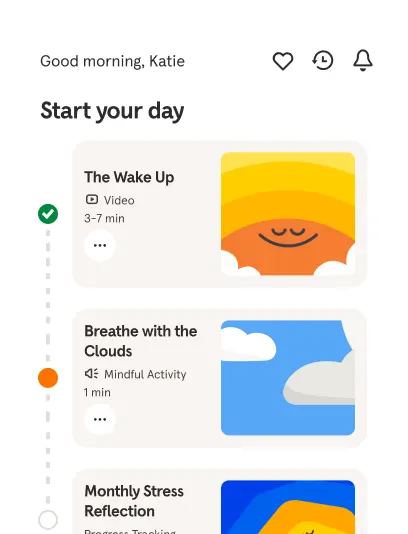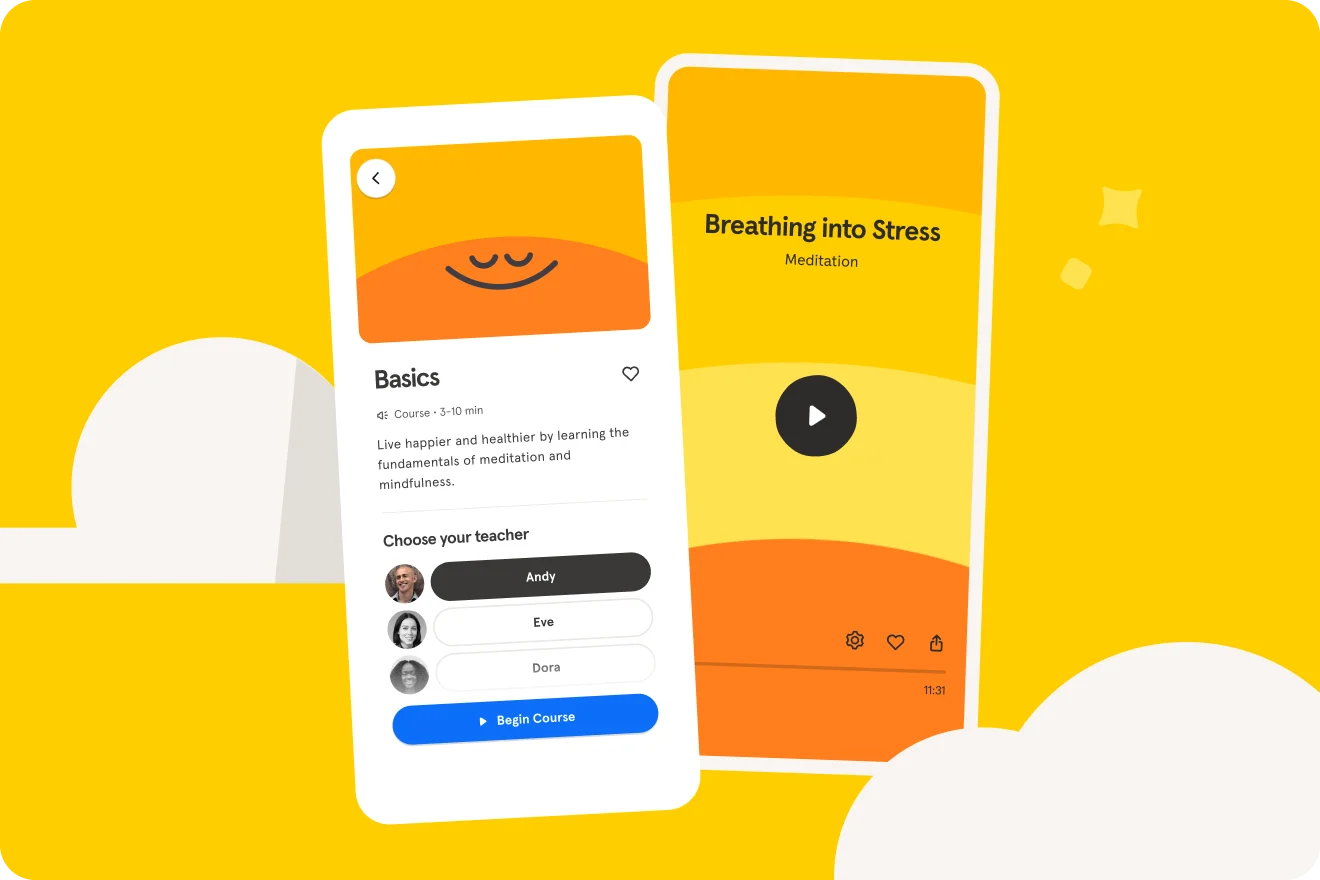The Importance of Movement
Washington Post Health and Wellness Columnist Gretchen Reynolds hosts Radio Headspace all week. Today, she talks about how easy exercise can truly be, and the positive health benefits it offers. Learn more about Gretchen's work on washingtonpost.com.
Try 14 days freeBetter mental health starts with Headspace. Unrivaled expertise to make life feel a little easier, using guided meditations, mindfulness tips, focus tools, sleep support, and dedicated programs.
Try 14 days free
(air whooshing) (computer mouse clicking) (bright gentle music) Headspace Studios. (light thoughtful music) Hey, everyone. I'm Gretchen Reynolds. Welcome to Radio Headspace and to Monday morning. I'll be guest-hosting Radio Headspace this week, and it's great to be here with you. I'm a journalist, author, and I write about exercise science and fitness in my Washington Post column, "Your Move." My work is all about helping people understand why incorporating movement into your day can benefit your body, mind, and overall well-being. This week, I'm breaking down the science and benefits of exercise. We're gonna dive into how physical movement can improve our mental health, give us a fighting chance against disease, and just help us feel better at any age. (birds chirping) (gentle sparse music) As someone who writes about the science of exercise, probably the most interesting thing to me is how deeply exercise and the need for movement is embedded into our very genetics. We long ago were hunter-gatherers as a species. And when you're a hunter-gatherer, you have to move, either to find food or to avoid being food. And if you didn't move, you didn't survive and pass along your genes. So very early in our evolution, the need for movement became just entwined into our genetics, and because of that, it's very important to our health and it's very important to our mental health. It affects how calm you are. It affects how anxious you are. It affects your blood pressure. It affects how well your brain works. Almost everything about how you feel and how your body is functioning depends on getting up and moving around. (insects chirping) (gentle thoughtful music) Some of the common misconceptions about fitness that keeps so many of us from actually being active are that it has to be hard. It has to be at a gym. You have to have the right shoes. You have to be thin. You have to be coordinated. And the fact of the matter is not one of those have-tos is true. There's very good science that any amount of movement can contribute to better health, and that means 10 seconds of getting up and walking from one end of your office to the other end of your office. That actually begins some of the physiological effects that can end in better health, better endurance, greater strength. Just think of it as doing what your body was born to do, which is move. (rain pattering) (light gentle music) Don't add to the responsibilities you have by thinking you have to exercise. Find a way to reframe this time as a way to give yourself pleasure, a way to give yourself calming. There was a really interesting study that looked at what happened when they told people that they had to go for a walk or that they were spending some time with friends while walking. And when they spent time with friends while walking, they went further. They went faster. They said afterwards that they couldn't...
Details
About your teachers
- More about Andy
A former Buddhist monk, Andy has guided people in meditation and mindfulness for 20 years. In his mission to make these practices accessible to all, he co-created the Headspace app in 2010.
- More about Eve
Eve is a mindfulness teacher, overseeing Headspace’s meditation curriculum. She is passionate about sharing meditation to help others feel less stressed and experience more compassion in their lives.
- More about Dora
As a meditation teacher, Dora encourages others to live, breathe, and be with the fullness of their experiences. She loves meditation’s power to create community and bring clarity to people’s minds.
- More about Kessonga
Kessonga has been an acupuncturists, therapist, and meditation teacher, working to bring mindfulness to the diverse populations of the world.
- More about Rosie
Rosie Acosta has studied yoga and mindfulness for more than 20 years and taught for over a decade. Rosie’s mission is to help others overcome adversity and experience radical love.

Your lifelong guide to better mental health
Stress, sleep, and all the challenging emotions — care for your mind with the everyday mental health app that's shown to make a difference.
Try 14 days free
Look after your mind
Proven guided meditations and programs to help you stress less, sleep more soundly, and better navigate life’s challenges

Science-backed
Studies show that using Headspace for 30 days can reduce stress, increase resilience, and improve overall well-being

Explore 1000+ expert-led exercises
Access our library of meditations, breathing exercises, and guidance videos for stress, sleep, focus, everyday anxiety , parenting, and more.
Member reviews
Hear from some of our members
Your app brings so much peace and tolerance to our home.
Rachel
UK
Changing my thoughts has allowed me to change my life.
Davide
London
The stress and loneliness courses … taught me how to comfort myself.
Alicia
Canada
Headspace provides me with … a connection to myself, and a disconnection from negative thoughts, feelings, and sensations.
Keri
UK
Related to 'The Importance Of'
- © 2024 Headspace Inc.
- Terms & conditions
- Privacy policy
- Consumer Health Data
- Your privacy choices
- CA Privacy Notice

